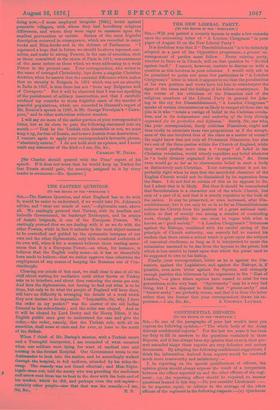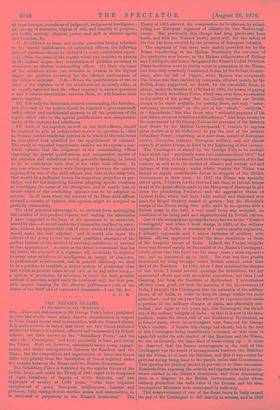CONFIDENTIAL REPORTS.
[TO THE EDITOR OF THE "SPECTATOR.]
Sin,—In one of the paragraphs of your last week's issue you express the following opinion,—" The whole body of the Army distrust confidential reports." For the last ten years it has been my duty to fill in answers to the questions contained in these Reports, and it has always been my opinion that even in their pre- sent amended shape these reports are very defective and useless documents. By adopting the following confidential suggestions, I think the information derived from reports would be rendered much more trustworthy and satisfactory :—
I. In reporting on the special qualifications of officers, the opinion given should always express the result of a comparison between the officer reported on and the other officers of the regi- ment; e.g., the reporting officer should be required to answer questions framed in this way :—Do you consider Lieutenant — to be superior, equal, or inferior to the average of the other officers of the regiment in the following respects :—(a) Quickness of apprehension, soundness of judgment, and general intelligence ; (b) energy of character, vigour of will, and tenacity of purpose; (d) bodily activity, physical power, and skill in athletic sports and exercises, &c.
II. In addition to these and similar questions having reference to the special qualification of individual officers, the following general questions should be included in every confidential report : —(a) State the name of the captain whom you consider to possess in the highest degree that combination of qualities necessary to constitute an efficient commanding officer. (b) State the name of the subaltern whom you consider to possess in the highest degree the qualities necessary for the efficient performance of the duties of adjutant. N.B.—When the qualifications of two or more of the captains or of the subalterns are so nearly alike, or so equally balanced that the officer required to answer questions a and b cannot discriminate between them, he will bracket their names together.
III. Not only the iieutenant-colonel commanding the battalion, but also each of the majors should be required to give separately independent and confidential answers to all the questions of the report which refer to the special qualifications and comparative merit of the captains and subalterns.
IV. Each of the captains, as well as the field-officers, should
be required to give an independent answer to question b,—that is, to state confidentially his opinion as to which of the subalterns he considered best qualified for the appointment of adjutant. The result of repeated experiments enables me to express a con- fident opinion that the judgment of the commanding officer respecting the special qualifications and comparative merits of the captains and subalterns would, generally speaking, be found to be in accordance with that of the other field-officers. In any case where there was a wide divergence between the opinion expressed by one of the field-officers and that of-the other two, that would be a sufficient reason for suspecting prejudice or par- tiality, and for the inspecting General adopting special measures to investigate the cause of the divergence, and to enable him to decide which of the conflicting opinions was to be adopted as correct. In all cases where the answers of the three field-officers showed a consent of opinion, that opinion might be accepted as perfectly trustworthy.
The chief practical advantage to be derived from multiplying the number of independent reports, and making the alterations I have suggested in the form of the questions to be answered, would be this,—it would enable the Commander-in-Chief to ascer- tain, without any appreciable risk of error, which of the subalterns would make the best adjutant; and it would also cause the officers of the Army to feel the most confident assurance of the
perfect fairness of the method of selecting subalterns to succeed to that appointment. As soon as the Army is convinced that for the future the adjutant of a regiment will invariably be superior to every other subaltern in intelligence, in energy of character, in professional acquirenients, and in general efficiency, we shall be in a position to establish a better system of promotion than that which at present exists in our own or in any other army,— a system of promotion by selection, in which the best possible method of selection might easily be combined with the best pos- sible special training for the efficient performance both of the duties of the Staff and of regimental command.—I am, Sir, &c.,
A. C. R.



































 Previous page
Previous page